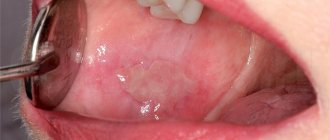An unpleasant odor emanating from the oral cavity causes psychological discomfort, reduces self-esteem, and can signal various pathologies in the body, systemic diseases, and physiological disruptions in the functioning of internal organs.
The reason does not always lie in insufficient hygiene or dental diseases. The smell of ammonia from the mouth in adults may indicate problems in the functioning of the digestive tract, impaired functioning of the kidneys, liver, as well as the presence of other health problems in a person.
Causes of ammonia odor from the mouth
The content of the article
An unpleasant specific urine (ammonia) odor from the mouth can appear for a variety of reasons. Lack of proper oral hygiene, systemic diseases, exacerbation of chronic pathologies, the presence of bacterial flora, endoparasites in the body. Consumption of food can be one of the causes of bad breath.
Important! To determine the root cause of ammonia breath, undergo a comprehensive diagnostic examination at a medical center.
The main causes of urine stench from the oral cavity:
- disruption of metabolic processes in the body;
- unbalanced nutrition, protein, low-carbohydrate, express diets, fasting;
- disruptions in the functioning of the endocrine system and gastrointestinal tract;
- ENT diseases;
- diseases of the oral cavity (caries, gingivitis, stomatitis);
- bacterial, viral, parasitic diseases, infections;
- chronic kidney pathologies;
- bad habits (abuse of alcohol, nicotine);
- dehydration, intoxication of the body.
Ammonia is a natural waste product in the body. It is formed during the digestion of proteins and amino acids. The kidneys are responsible for removing metabolic products. Therefore, most often a metallic taste in the mouth and an ammonia odor from the oral cavity are experienced by people who have been diagnosed with problems in the functioning of the genitourinary tract.
Urine aroma from the mouth is one of the characteristic symptoms of disorders in the genitourinary tract. If there is a malfunction of the kidneys, tubular dysfunction, renal failure, dystrophy, as well as stones in the bladder, the processes of removing metabolic products (decomposition) from the body are disrupted.
Carrying through the bloodstream, they penetrate the lungs and become part of the air that we exhale. In case of renal failure, pyelonephritis, the smell of urine can emanate from the entire body.
Important! If the disease is in the acute stage, at the peak of its development, the smell of ammonia from the mouth will have an increased concentration.
In addition to bad breath, if the functioning of the kidneys is impaired, the following are noted: surges in blood pressure, the appearance of peripheral edema on the body, difficulty urinating, pain in the lumbar region, anemia of the mucous membranes.
Stale ammonia breath and a specific taste in adult patients are noted when:
- gastritis, peptic ulcers;
- pathology of the bile ducts, cholelithiasis;
- increased stomach acidity;
- pancreatitis;
- problems with the intestines (dysbacteriosis).
A metallic taste, a white coating on the tongue, and increased thirst may indicate the development of diabetes mellitus.
Important! A sharp uremic odor from the mouth may indicate an approaching glycemic coma. In addition to the foul odor, general health worsens, the skin and mucous membranes turn pale. The vision becomes dark, the head becomes dizzy, the heartbeat accelerates, and the overall body temperature rises.
An increase in the concentration of glucose (sugar) in the bloodstream accelerates the formation of ketone bodies, which cause the appearance of a characteristic foul odor.
What is ozena?
This pathology affects the mucous membrane in the nose, and as it progresses, it affects the cartilage and bones. Medicine cannot yet name the exact reasons for the development of this disease, but people with underdeveloped frontal sinuses, excessively wide wings of the nose and an expanded facial part of the skull are predisposed to it.
The risk increases with poor nutrition, living in unsanitary conditions, and degeneration of the nasal mucosa, which disintegrates as a result of this process.
Ozena can be eliminated using conservative methods, for example, prescribing suppositories, tampons, and rinsing. Often patients require surgery to correct the shape of the nose. In this case, respiratory functions are completely preserved, but there is constant dryness. As a result, crusts appear that provoke an unpleasant odor. As the disease spreads, the larynx and middle ear are affected.
The smell of ammonia also occurs in the nose with diseases such as parosmia, allergies, sinusitis, and rhinitis. Parosmia is a condition characterized by impaired sense of smell due to various pathologies of the respiratory tract. At the same time, a person smells ammonia or another strong smell, but those around him do not feel it.
Other causes of urine odor from the mouth
Protein diets, prolonged fasting, monotonous, unbalanced nutrition, drinking a small amount of liquid per day often lead to disruption of water-salt and electrolyte balance. If a large amount of protein food enters the body, the load on the kidneys and liver increases significantly.
Medicines, protein complexes, and nutritional supplements can also cause bad breath. Especially if pharmacological preparations, mineral and vitamin complexes contain nitrogen-containing substances, amino acids, and proteins.
Abuse of alcohol, drugs, and bad habits lead to irreversible consequences in the body and provoke the development of various systemic pathologies and functional disorders.
A constantly emanating uremic aroma indicates a violation of biochemical processes in our body. Therefore, in order to eliminate and neutralize the stench, it is important to establish the root cause of ammonia “amber”.
Vinegar
A thin, acidic liquid, vinegar contains acetic acid and removes a wide range of odors from a variety of surfaces. Vinegar neutralizes ammonia, getting rid of that odor. Since vinegar is inexpensive, many people use the all-purpose liquid to clean their homes from top to bottom. To remove ammonia odor, blot or spray the area with clean, undiluted white vinegar. Let the vinegar dry on the surface. Reapply vinegar as needed until the ammonia odor is no longer present.
Symptoms, diagnosis
Excess ammonia in the body can lead to a deterioration in general condition, malfunction of internal organs, slowdown of metabolism and metabolic processes at the cellular level. A person feels a sour-sweet taste, severe weakness, fatigue, irritability, and a deteriorating emotional state. Severe headaches, fever, sudden mood swings are possible.
A strong uremic odor from the mouth can occur in adults at any age. Only by establishing the root cause can you select adequate treatment and effective techniques that will restore fresh breath. It is necessary to undergo a comprehensive diagnostic examination at a medical center.
Important! Therapeutic methods and pharmacological agents should be prescribed by a doctor based on the diagnostic results. Self-medication can only aggravate the situation and lead to the development of serious complications and health problems.
It is necessary to undergo examination by a gastroenterologist, therapist, endocrinologist, or dentist. It is imperative to do an ultrasound of the internal organs, a general and biochemical blood test.
Baking soda
Baking powder is an inexpensive, natural and versatile powder that has many uses around the home. Remove ammonia odor from carpets by covering the fibers with a thin layer of baking soda. Baking soda will absorb the ammonia smell as well as any lingering odors stuck in your carpets. Work the baking soda into the carpet fibers using a brush or scrubbing brush. Leave the baking soda on the surface for 24 hours. After the allotted time, use a vacuum cleaner to suck the baking soda out of the carpet. If the ammonia smell remains, repeat the process.
Treatment
Drug therapy, regimen, course, and duration of treatment are selected individually in each specific case. The choice of treatment methods depends on the root cause, age, and general physiological condition of the person.
Patients may be prescribed:
- enzyme agents;
- symptomatic medications;
- immunomodulators;
- hepatoprotectors;
- antibacterial, antiparasitic complex drugs;
- diuretics, hormones;
- anti-inflammatory drugs.
If bad breath is caused by acute or chronic pathologies or diseases, much attention is paid to symptomatic therapy and complex treatment.
Aerosols that suppress the development of pathogenic flora and special antiseptic solutions will help:
- Stopagin. A complex drug with a pronounced antiparasitic and antibacterial effect. Prescribed for rinsing.
- Chlorhexidine. Has an aseptic, bactericidal effect. Used to treat pathologies of the urinary system.
- Hexoral. An effective remedy for the treatment of dental diseases.
If endocrine disorders are diagnosed, treatment therapy is carried out under the supervision of the attending physician. Drugs are prescribed to suppress the activity of the thyroid gland, normalize its functioning, and secretory activity. For thyrotoxicosis, radioactive iodine is used.
For renal diseases, drug therapy depends on the form and stage of the underlying disease. Diuretics, anti-inflammatory, and antibacterial agents with complex effects may be prescribed, the action of which is aimed at relieving the clinical symptoms of the disease.
If uremic stench is provoked by strict diets, prolonged fasting, unbalanced nutrition, the attending physician or nutritionist will adjust the diet and prescribe a special diet to normalize metabolic processes and water and electrolyte balance in the body.
Hydrogen peroxide
Most people keep a bottle of hydrogen peroxide in their medicine cabinet as it serves to clean and disinfect minor scrapes and scratches from dirt, germs, and bacteria. Found in the health and beauty sections of stores, hydrogen peroxide neutralizes ammonia and removes the associated odor. When removing ammonia odors, use 3% hydrogen peroxide and dilute it with water - use a ratio of 70% water to 30% hydrogen peroxide. Soak a white cloth in the peroxide mixture and rinse the area affected by the ammonia odor for a few seconds. After removing odors, rinse the mixture from the surface with cool water.
Eliminating ammonia odor using folk remedies
Sweat with the smell of ammonia, the causes of which do not require complex therapy, can be eliminated with the help of medicinal herbs and traditional medicine recipes:
- You can reduce the intensity of sweating in the summer season, especially in extreme heat, with the help of sage. One cup of tea from this plant throughout the day will provide the body with tone and reduce the activity of the sweat glands. Tea should be consumed without sugar;
- natural vegetable oils perfectly reduce sweating in people with dry skin. The greatest effect is provided by sage or eucalyptus oil. The compositions applied to problem areas moisturize the skin well and reduce the amount of sweating. Oils can also be used during bath procedures, adding a few drops to the water;
- baths with the aroma of pine needles help get rid of the nasty ammonia smell. The flavonoids contained in pine effectively relieve tension, soothe the skin and reduce the intensity of sweating;
- Baths will help eliminate the smell of ammonia from your feet. An effective remedy is salt added to water. It attracts toxins and ammonia accumulated in the pores of the epidermis; only after a bath, your feet should be washed in clean water and wiped dry. Baths with the addition of crushed oak or sage bark will be useful for combating the ammonia stench. In addition to the therapeutic effect, such compositions saturate the skin of the feet with a pleasant herbal aroma.
There are also many other recipes and compositions, the use of which can, if not completely eliminate, then significantly reduce the smell of ammonia from sweat. Only to achieve results you need to follow the treatment regimen with a specific remedy and then you can get rid of the strong stench.
Why do they arise?
The cause of phantosmia and parosmia is damage to the olfactory receptors in the nasal cavity, the sensory nerves that conduct signals to the corresponding area of the brain, or the cortical center that processes the information received. Symptoms are observed with head injury, cerebral tumors, some neurological diseases, inflammatory lesions of the paranasal sinuses and upper respiratory tract. Sometimes viral infections, in particular COVID-19, act as a provoking factor.
Baby smells like ammonia
The appearance of a strong ammonia stench in a child should alert parents. Such manifestations can be caused by diseases that parents are not even aware of.
Typically, a peculiar smell of sweat appears in adolescence due to hormonal changes. Until the physiological restructuring of the body, no third-party aromas are observed during the process of sweating.
If a child's sweat smells like ammonia, then this condition increases the child's risk of diabetes, kidney failure and other serious diseases. To eliminate complications and eliminate pathologies in the initial stages, you must urgently contact a pediatrician and undergo all the necessary examinations.
When no pathological manifestations are detected, then parents should pay more attention to the hygiene of the baby’s body, always dress him according to the weather, do not overheat him excessively and regularly ventilate the child’s room.
Useful video
From this video you will learn which disease symptoms bad breath can cause:
Bad breath causes discomfort when communicating with other people , which leads at a minimum to poor health, mood, and at most to neurosis and loss of social connections.
In order to avoid the problem of ammonia taste in the mouth, you need to eat a balanced diet, lead a healthy lifestyle, sleep more and do exercises every morning.
If the symptom is already bothering you, you should consult a doctor. Timely medical care will help preserve health and prevent serious consequences.
Clothing soaked in ammonia sweat: how to fix it
If the sweat smells like ammonia in people with excessive sweating, then in addition to psychological discomfort, such phenomena also leave their marks on clothes. Things become saturated with sweat, stains remain on them, and yellow spots form under the arms.
You can remove stains and unpleasant odors from clothes in the following ways:
- prepare a saline solution in the proportion of 1 tbsp. l. salt per 1 glass of water. Thoroughly wipe any stains with the prepared mixture. For thick wool fabrics, you can add more salt;
- Citric acid or vinegar removes sweat stains well. It is not advisable to use the products in their pure form; they must be diluted with water;
- If your fur collars stink later, you can get rid of the smell with gasoline. Only after this you need to thoroughly dry and ventilate your winter clothes.
What to do when none of the methods fix the problem? How to save your things if your sweat stinks of ammonia? Then the only method left, although expensive, is dry cleaning.










